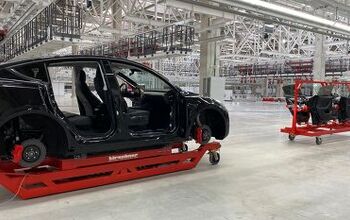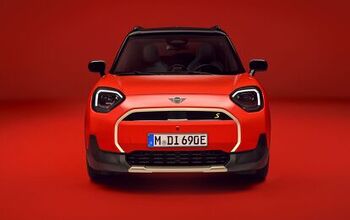Why Did Honda Pair With GM on EVs?

Last month, we wrote up the news that Honda will be working on a battery-electric vehicle called the Prologue — not to be mixed up with the Prelude — and the company would work with General Motors, using GM’s Ultium battery packs.
Why would Honda, known especially for engine development, pair with GM?
To refresh your memory, the Prologue is a battery-electric vehicle set for launch in 2024, one of two that will be using GM’s Ultium battery pack and “ skateboard-style” platform. The other BEV will be an Acura.
Honda says that partnering with GM will help it shift to EVs sooner than it could on its own.
“Leveraging strategic partners to achieve scale and mitigate initial investment requirements” would help Honda get an EV to market sooner than if it did it on its own, Dave Gardner, American Honda’s executive vice president of national operations, said during a media background briefing earlier this year. “Our zero-emission focus has begun.”
That’s not too far off what Chris Martin, a PR spokesperson for Honda, told us.
“Honda and General Motors have a long history of cooperative agreements including powertrain sharing, fuel cell joint ventures and common investment in Cruise, the automated vehicle startup,” Martin said. “Thus, as we evaluated potential strategic relationships for North America, those past and existing relationships along with our evaluation of Ultium technology led us to agree to co-develop these two BEVs for the North American market. This partnership will help unlock economies of scale for both companies and accelerate Honda’s electrification roadmap in North America with our first volume BEVs.”
Translation: Ultium will help Honda get the two vehicles to market sooner and at a lower development cost.
Still, I had to ask why Honda would partner with anyone at all, given its past successes in developing powertrains — and its past efforts when it comes to electrification (Insight, Clarity). Partnering has its advantages, sure, but Honda’s past would suggest it doesn’t need to pair up.
“You may recall in April 2021, our global CEO, [Toshihiro] Mibe-san announced key targets for sales of electrified vehicles in North America, with a plan to make battery-electric and fuel cell electric vehicles to represent 100 percent of its vehicle sales by 2040, progressing from sales of 40 percent by 2030 and 80 percent by 2035,” Martin said. “In addition to reiterating the co-development of two vehicles with GM, Honda also announced plans to launch a series of new EV models based on a new e:Architecture, with development led by Honda, beginning from the second half of the decade. So, you will see Honda-developed electric vehicles as part of our lineup in the latter half of this decade.”
Cutting through the PR speak once again: “We’re partnering now in order to get a couple of BEVs to market quickly and at a low cost, but we also have plans to develop models without pairing up. It will just take longer for them to reach market.”
Honda is targeting 100 percent EV sales by 2040.
I also asked if Honda had other plans for pairing up with GM or other automakers, and got a version of the “we don’t talk about future products” that every journalist covering this industry is familiar with. In this case, Martin said Honda was open to partnerships but would not speculate further about possible pairings.
So that’s the story, straight from the automaker’s mouth, so to speak — it’s not that Honda believes itself incapable of building an EV in-house, but it can save some money and time by working with GM. It also allows Honda to move cautiously when it comes to EV development — if the market continues to be slow to adopt BEVs, Honda won’t be on the hook for the entire cost burden.
We wouldn’t be shocked to see more of these partnerships come about as some automakers find it better to partner with those who are a bit further ahead on EV development than to be completely on the hook for the full development costs of cars that the market may initially shun.
[Image: Honda]

Tim Healey grew up around the auto-parts business and has always had a love for cars — his parents joke his first word was “‘Vette”. Despite this, he wanted to pursue a career in sports writing but he ended up falling semi-accidentally into the automotive-journalism industry, first at Consumer Guide Automotive and later at Web2Carz.com. He also worked as an industry analyst at Mintel Group and freelanced for About.com, CarFax, Vehix.com, High Gear Media, Torque News, FutureCar.com, Cars.com, among others, and of course Vertical Scope sites such as AutoGuide.com, Off-Road.com, and HybridCars.com. He’s an urbanite and as such, doesn’t need a daily driver, but if he had one, it would be compact, sporty, and have a manual transmission.
More by Tim Healey
Latest Car Reviews
Read moreLatest Product Reviews
Read moreRecent Comments
- Varezhka I have still yet to see a Malibu on the road that didn't have a rental sticker. So yeah, GM probably lost money on every one they sold but kept it to boost their CAFE numbers.I'm personally happy that I no longer have to dread being "upgraded" to a Maxima or a Malibu anymore. And thankfully Altima is also on its way out.
- Tassos Under incompetent, affirmative action hire Mary Barra, GM has been shooting itself in the foot on a daily basis.Whether the Malibu cancellation has been one of these shootings is NOT obvious at all.GM should be run as a PROFITABLE BUSINESS and NOT as an outfit that satisfies everybody and his mother in law's pet preferences.IF the Malibu was UNPROFITABLE, it SHOULD be canceled.More generally, if its SEGMENT is Unprofitable, and HALF the makers cancel their midsize sedans, not only will it lead to the SURVIVAL OF THE FITTEST ones, but the survivors will obviously be more profitable if the LOSERS were kept being produced and the SMALL PIE of midsize sedans would yield slim pickings for every participant.SO NO, I APPROVE of the demise of the unprofitable Malibu, and hope Nissan does the same to the Altima, Hyundai with the SOnata, Mazda with the Mazda 6, and as many others as it takes to make the REMAINING players, like the Excellent, sporty Accord and the Bulletproof Reliable, cheap to maintain CAMRY, more profitable and affordable.
- GregLocock Car companies can only really sell cars that people who are new car buyers will pay a profitable price for. As it turns out fewer and fewer new car buyers want sedans. Large sedans can be nice to drive, certainly, but the number of new car buyers (the only ones that matter in this discussion) are prepared to sacrifice steering and handling for more obvious things like passenger and cargo space, or even some attempt at off roading. We know US new car buyers don't really care about handling because they fell for FWD in large cars.
- Slavuta Why is everybody sweating? Like sedans? - go buy one. Better - 2. Let CRV/RAV rust on the dealer lot. I have 3 sedans on the driveway. My neighbor - 2. Neighbors on each of our other side - 8 SUVs.
- Theflyersfan With sedans, especially, I wonder how many of those sales are to rental fleets. With the exception of the Civic and Accord, there are still rows of sedans mixed in with the RAV4s at every airport rental lot. I doubt the breakdown in sales is publicly published, so who knows... GM isn't out of the sedan business - Cadillac exists and I can't believe I'm typing this but they are actually decent - and I think they are making a huge mistake, especially if there's an extended oil price hike (cough...Iran...cough) and people want smaller and hybrids. But if one is only tied to the quarterly shareholder reports and not trends and the big picture, bad decisions like this get made.


































Comments
Join the conversation
EV development is very expensive!! Better to pad your bets taping a competitor’s technology than putting all your eggs in one basket.
Contour/mystique: if you can get 4banger zetec w manual trans great car. Reliable, good handling n great simple interior layout.